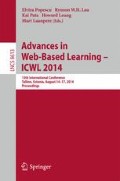Abstract
The affordances of MMORPGs provide authentic contexts for vocabulary acquisition. This study conducted incidental vocabulary learning on an MMORPG and investigated the effects of prior knowledge. The prior knowledge in the study was including English proficiency and gaming experience. To evaluate the learning effectiveness, 12 target words were appeared in task dialogues and flashcards on the MMORPG. An experiment was conducted for 52 fifth-grade students. The results show that the learners with medium gaming experience level had significant learning effectiveness for the vocabulary positioned in task dialogues. On the contrary, except high gaming experience learners, the learning effects of flashcard were more influenced by English academic level. In other words, the vocabulary in gaming requirement condition were more noticed by medium gaming experience learners, and the vocabulary in non-requirement condition were more perceived by higher English proficiency learners.
Access this chapter
Tax calculation will be finalised at checkout
Purchases are for personal use only
Preview
Unable to display preview. Download preview PDF.
References
Rankin, Y., Gold, R., Gooch, B.: 3D role-playing games as language learning tools. Proceedings of EuroGraphics 25(3), 211–225 (2006)
Peterson, M.: Massively multiplayer online role-playing games as arenas for second language learning. Computer Assisted Language Learning 23, 429–439 (2011)
Thorne, S.L., Black, R., Sykes, J.M.: Second language use, socialization, and learning in Internet communities and online gaming. The Modern Language Journal 93, Focus Issue, 802–821 (2009)
Sylvén, L.K., Sundqvist, P.: Gaming as extramural English L2 learning and L2 proficiency among young learners. ReCALL 24(3), 302–321 (2012)
Day, R.R., Omura, C., Hiramatsu, M.: Incidental EFL vocabulary learning and reading. Reading in a Foreign Language 7, 541–551 (1991)
Krashen, S.D.: We acquire vocabulary and spelling by reading: Additional evidence for the input hypothesis. Modern Language Journal 73, 440–464 (1989)
Nagy, W.E., Herman, P.A., Anderson, R.C.: Learning words from context. Reading Research Quarterly 20, 233–253 (1985)
Kuppens, A.H.: Incidental foreign language acquisition from media exposure. Learning, Media and Technology 35(1), 65–85 (2010)
Dalton, B., Grisham, D.L.: eVoc Strategies: 10 Ways to Use Technology to Build Vocabulary. The Reading Teacher 64(5), 306–317 (2011)
Jenkins, C., Corritore, C.L., Wiedenbeck, S.: Patterns of information seeking on the Web: A qualitative study of domain expertise and Web expertise. IT & Society 1(3), 64–89 (2003)
Tsai, F.H., Yu, K.C., Hsiao, H.S.: Exploring the Factors Influencing Learning Effectiveness in Digital Game-based Learning. Educational Technology & Society 15(3), 240–250 (2012)
Swanborn, M.S.L., De Glopper, K.: Impact of reading purpose on incidental word learning from context. Language Learning 52(1), 95–117 (2002)
Yoshii, M., Flaitz, J.: Second Language Incidental Vocabulary Retention: The Effect of Picture and Annotation Types. CALICO Journal 20(1), 33–58 (2002)
Lu-Fang, L.: A video-based CALL program for proficient and less-proficient L2 learners’ comprehension ability, incidental vocabulary acquisition. Educational Media International 47(3), 199–216 (2010)
Kuppens, A.H.: Incidental foreign language acquisition from media exposure. Learning Media and Technology 35(1), 65–85 (2010)
Gee, J.P.: Good Video Games Plus Good Learning. Peter Lang, New York (2007)
McGraw, I., Yoshimoto, B., Seneff, S.: Speech-enabled card games for incidental vocabulary acquisition in a foreign language. Speech Communication 51(10), 1006–1023 (2009)
Suh, S., Kim, S.W., Kim, N.J.: Effectiveness of MMORPG-based instruction in elementary English education in Korea. Journal of Computer Assisted Learning 26(5), 370–378 (2010)
Ellis, R.: Factors in the Incidental Acquisition of Second Language Vocabulary from Oral Input: A Review Essay. Applied Language Learning 5(1), 1–32 (1994)
Orvis, K.A., Horn, D.B., Belanich, J.: The roles of task difficulty and prior videogame experience on performance and motivation in instructional videogames. Computers in Human Behavior 24(5), 2415–2433 (2008)
Ko, M.H.: Glossing and second language vocabulary learning. Tesol Quarterly 46(1), 56–79 (2012)
Kost, C.R., Foss, P., Lenzini, J.J.: Textual and pictorial glosses: Effectiveness on incidental vocabulary growth when reading in a foreign language. Foreign Language Annals 32(1), 89–97 (1999)
Paribakht, T.S., Wesche, M.B.: ’Reading comprehension and second language development in a comprehension-based ESL program. TESL Canada Journal 11(1), 09–29 (1993)
Read, J.: Assessing vocabulary. Cambridge University Press, Edited work, Cambridge (2000)
Yeu, M., Yoon, H.S., Taylor, C.R., Lee, D.H.: Are Banner Advertisements in Online Games Effective? Journal of Advertising 42(2-3), 241–250 (2013)
Author information
Authors and Affiliations
Editor information
Editors and Affiliations
Rights and permissions
Copyright information
© 2014 Springer International Publishing Switzerland
About this paper
Cite this paper
Huang, BG., Yang, J.C. (2014). The Effects of Prior Knowledge for Incidental Vocabulary Acquisition on Multiplayer Online Role-Playing Game. In: Popescu, E., Lau, R.W.H., Pata, K., Leung, H., Laanpere, M. (eds) Advances in Web-Based Learning – ICWL 2014. ICWL 2014. Lecture Notes in Computer Science, vol 8613. Springer, Cham. https://doi.org/10.1007/978-3-319-09635-3_10
Download citation
DOI: https://doi.org/10.1007/978-3-319-09635-3_10
Publisher Name: Springer, Cham
Print ISBN: 978-3-319-09634-6
Online ISBN: 978-3-319-09635-3
eBook Packages: Computer ScienceComputer Science (R0)

